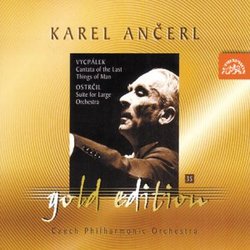| All Artists: Ladislav Mraz, Otakar Ostrcil, Ladislav Vycpalek, Karel Ancerl, Czech Philharmonic Orchestra, Drahomira Tikalova Title: Ancerl Gold Edition 35: Vycpalek / Cantata of the Last Things of Man; Ostrcil / Suite for Large Orchestra Members Wishing: 0 Total Copies: 0 Label: Supraphon Release Date: 11/30/2004 Album Type: Import Genre: Classical Styles: Opera & Classical Vocal, Historical Periods, Modern, 20th, & 21st Century, Symphonies Number of Discs: 1 SwapaCD Credits: 1 UPC: 099925369521 |
Search - Ladislav Mraz, Otakar Ostrcil, Ladislav Vycpalek :: Ancerl Gold Edition 35: Vycpalek / Cantata of the Last Things of Man; Ostrcil / Suite for Large Orchestra
 | Ladislav Mraz, Otakar Ostrcil, Ladislav Vycpalek Ancerl Gold Edition 35: Vycpalek / Cantata of the Last Things of Man; Ostrcil / Suite for Large Orchestra Genre: Classical |
Larger Image |
CD Details |
CD ReviewsAn important release G.D. | Norway | 09/06/2009 (5 out of 5 stars) "This is actually a rather important release (or reissue) - something of a find, even. Ladislav Vycpalek (whose Requiem features on another volume in this series) is here represented by the Cantata of the Last Things of Man, a remarkable 40-minute work scored for soloists, choir and large orchestra. Written in 1922, it is based on folk texts and the music is direct and poignant and strongly influenced by Czech folk-music, but with sophisticated use of counterpoint and orchestral color. The idiom is late romantic, but one can hear influences of Janacek (a composer Vycpalek admired) - admittedly without Janacek's striking originality, but still in an idiom individual enough to avoid sounding really like anyone else. All in all, what we get is a powerful, essentially uplifting work, and it receives a powerful, almost fervent performance here, with good soloists and generally marvelous orchestral playing - a little rough in places, perhaps, but those spots are easily forgotten when one lets oneself be ushered along by the fire and energy. The sound quality is also more than acceptable (the recording dates from 1961).
The music of Otakar Ostrcil (1879-1935) hasn't received much attention in the West, but what strikes one when listening to his Suite for Large Orchestra (1912) is first and foremostly how utterly original the idiom is - this is music that doesn't sound like anyone else's (there are touches of something resembling Mahler and Zemlinsky, perhaps, and certainly his teacher Fibich, but these are not what you would notice without analyzing in detail), at least not anyone less than 20 years younger than him (I guess you find touches of his music in the music of, say, Moyzes, so in that sense Ostrcil is something of a missing link). In terms of idiom, the music sounds like an individual cross between late Romanticism and linear constructivism - the music dry-witted, mischievous with a dark side, dotted with fairy fires and often turning back on itself to create something of a melodic spider web; it is atmospheric and memorably melodic and draws upon a wide range of compositional resources. Again the performances are superb, playing out the constantly shifting moods and colors to the full. The sound is fair, if a little gray and flat. All in all, this is a highly recommendable issue of two striking works, and does as such deserve wide circulation." |
